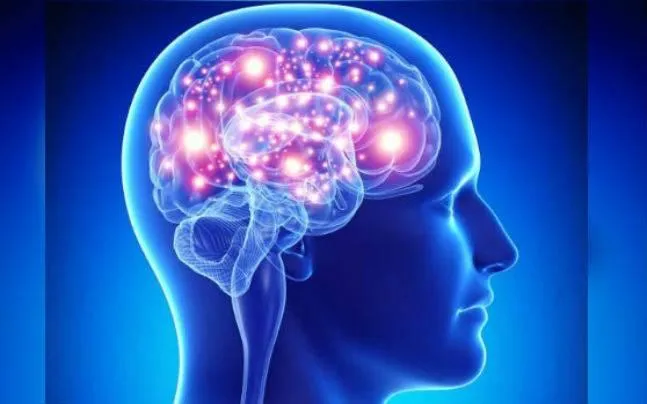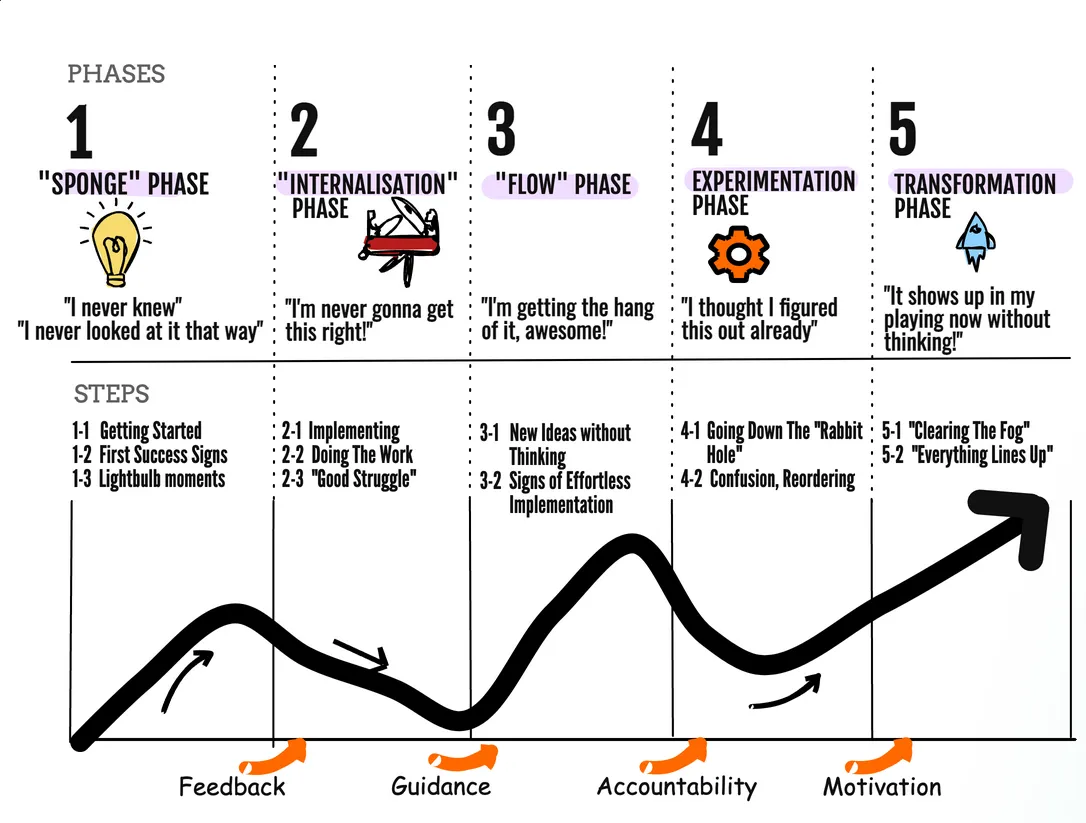THE SCIENCE OF LEARNING
How Modern Neuroscience Validates the TGT Approach
Understanding the Adult Brain's Learning Mechanisms
Recent neuroscience research has revolutionized our understanding of how adults learn musical instruments. Music aids formation and recovery of memory, and the brain's response to musical learning differs significantly from other cognitive tasks. At Total Guitar Transformation, our methodology aligns perfectly with these scientific discoveries, creating an optimal environment for adult guitar mastery.

Accessing Multiple Memory Systems for Accelerated Learning
The adult brain processes musical information through distinct but interconnected memory systems. Our TGT approach strategically engages all three critical memory layers:
Muscle Memory (Procedural Memory) Memory consolidation refers to the process of converting temporary memories into long-lasting ones, and guitar technique requires sophisticated motor pattern development. Our systematic practice of the Seven Layers builds precise motor memories through repetition with musical context, ensuring that technical skills become automatic while maintaining expressive quality.
Cognitive Memory (Declarative Memory) Music doesn't just help us retrieve stored memories; it also helps us lay down new ones. Our Hendrix-centered approach provides clear conceptual frameworks that adult brains can efficiently categorize and recall. By organizing guitar knowledge around proven musical examples rather than abstract theory, we accelerate the formation of usable cognitive maps.
Aural Memory (Auditory Processing) Emotional arousal acts as a modulator of memory encoding and consolidation, and music inherently carries emotional content. Our emphasis on studying master recordings creates powerful auditory memories that guide musical expression, while the emotional connection to legendary artists like Hendrix enhances retention significantly.
The Power of Structured Learning Architecture
Features of a test protocol can matter and that the temporal gradient of retrograde amnesia is not a fixed entity. Adult learners require clear, systematic progressions that respect their cognitive sophistication. Our four-phase structure—Basic Training, Layer Implementation, Repertoire Study, and Creative Graduation—mirrors the brain's natural consolidation processes.
Features of a test protocol can matter, and the temporal gradient of retrograde amnesia is not a fixed entity.

Systems Consolidation in Action: Consolidation is distinguished into two specific processes. The first, synaptic consolidation... occurs on a small scale in the synaptic connections and neural circuits within the first few hours after learning. The second process is systems consolidation, occurring on a much larger scale in the brain. Our approach ensures both immediate skill acquisition and long-term mastery by cycling through different practice modes and allowing adequate consolidation time between layers.
Schema Integration: How easily new information can be assimilated into a neocortical knowledge structure, such as a "schema," may depend on the extent to which subjects have an available framework of prior knowledge relevant to the new information being learned. Adult guitarists already possess musical schemas from years of listening experience. Our method leverages these existing neural frameworks, making new technical skills feel familiar and logical rather than foreign.
Purposeful Learning Drives Motivation and Success
Emotional Memory Enhancement
Because emotions enhance memory processes and music evokes strong emotions, music could be involved in forming memories. The neuroscience is clear: we remember what's important to us. Traditional guitar education often fails because it disconnects technique from meaningful musical expression.
Musical pieces that induce high arousal and very positive valence are remembered better by non-musicians than unarousing and emotionally neutral musical pieces. Our Hendrix-inspired curriculum taps into pre-existing emotional connections, creating powerful learning states that accelerate skill acquisition.

Intrinsic Motivation Activation Adult learners thrive when they understand the purpose behind each exercise. Rather than drilling scales in isolation, every TGT technique directly connects to iconic musical moments. This purposeful approach activates the brain's reward systems, maintaining engagement and effort over the extended periods required for mastery.
The Critical Role of Community Support
Learning in humans is highly embedded in social interaction: since the very early stages of our lives, we form memories and acquire knowledge about the world from and with others. Isolation kills adult learning motivation, while supportive communities accelerate progress dramatically.
Social Learning Theory in Practice Social learning theory (SLT) is a theory that explains human behavior as being learned through observation and modeling the behaviors, attitudes, and emotional reactions of others. Our Academy format provides multiple models—both instructor and peer—allowing students to observe successful learning patterns and adapt them to their own development.
Neurological Benefits of Support Systems Social support can directly influence learning motivation and function through the mediation of BJW. Research shows that social support doesn't just feel good—it literally changes brain chemistry to enhance learning capacity. Our community structure provides the encouragement, accountability, and shared experience that adult learners need to persist through challenging phases.
Interactive Learning Advantages Learning via solitary action may not be enough, while learning in interaction with others may be a key factor supporting acquisition of new knowledge in the real world. The TGT Academy's interactive format—combining personal instruction, peer feedback, and community challenges—creates the rich social learning environment that maximizes adult neuroplasticity.
The TGT Advantage: Science-Based Guitar Education
Traditional guitar instruction ignores these neurological realities, treating adult learners like oversized children who need more scales and theory.
Our approach recognizes that adult learning is paradigmically different in many different aspect than teaching for children, teenaged students, or even young adults.
By aligning our methodology with proven neuroscience principles—engaging multiple memory systems, providing clear structure, maintaining purposeful motivation, and fostering supportive community—TGT creates optimal conditions for adult guitar transformation.
This isn't just guitar education. It's neuroscience-informed musical development for the sophisticated adult mind.
More articles to read:
Memory Consolidation - PMC
Music, memory and emotion | Journal of Biology | Full Text
Full article: Differential effect of music on memory depends on emotional valence: An experimental study about listening to music and music training
Learning from others is good, with others is better: the role of social interaction in human acquisition of new knowledge - PMC
The Influence of Social Support on Higher Vocational Students’ Learning Motivation: The Mediating Role of Belief in a Just World and the Moderating Role of Gender - PMC
(PDF) The Neuroscience of Adult Learning
Ready to experience learning that works with your brain, not against it?
This site is not a part of the Facebook website or Facebook Inc. Additionally, this site is not endorsed by
Facebook in any way. FACEBOOK is a trademark of FACEBOOK, Inc.
